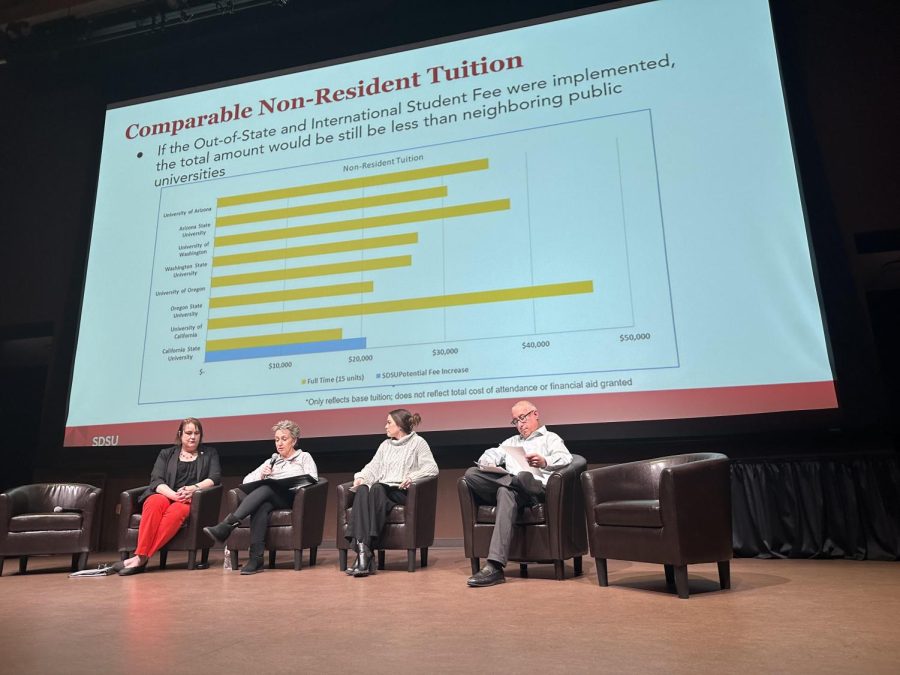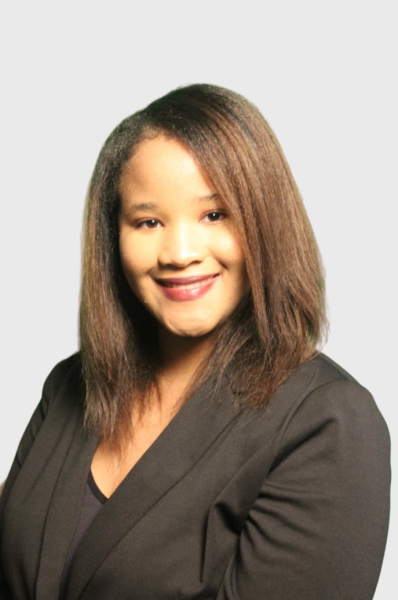An open forum council meeting was held at San Diego State University’s Union Theatre on Feb. 22 to discuss the proposed $1,500 out-of-state and international student fee.
Katie Robinson, director of Budget and Finance, began the panel for those in attendance with a scripted video examining what is included in the proposed fee.
The short video began by stating that student opinions surrounding the $1,500 out-of-state and international fee will be processed through an alternate consultation process.
The alternative consultation is facilitated by having an open panel — in this case, attending in-person meetings or virtually participating in Google forums — surveying student feedback. The Campus Fee Advisory Committee (CFAC), who is responsible for gathering student responses to ensure needs are met, will oversee this process.
After the presentation, the panel was open to questions from those in the audience. Due to the consideration of time, only five questions about the fee and its effect on out-of-state and international students were brought forward.
Among those in the crowd voicing concerns about the fee was Ilias Benbatoul, an Associated Students council representative of the College of Arts and Letters.
Benbatoul attended the meeting with the goal of providing a voice to the students in his college. He felt the scripted opening video was “disingenuous” and would have hoped for more human interaction between students and administrators regarding the fee.
“I think it’s very important to hear the voices of people from all walks of life; whether it’s international students or out-of-state students,” Benbatoul said. “Everyone comes from a different walk of life into a different environment where not everyone can afford $1,500 coming in. That’s what I was hoping that (administration) takes into consideration.”
Forty people were in attendance for the information session, consisting mainly of members from A.S. and administrators.
This alternative consultation differs from a standard referendum, which collects the majority’s consensus from a “yes” or “no” answer.
According to Robinson, in a policy placed within the California State University Chancellor’s Office, there are two ways the university can receive student comments on a proposed plan: through a referendum or alternative consultation.
“A lot of times a referendum is very black and white,” Robinson said. “(An) alternative consultation is generally used when there is a more nuanced conversation (to an idea) and the feedback can be more broader.”
If the $1,500 student fee is approved, it will aid in four categories: Research and Infrastructure, Academic Support, Financial Aid and CSU Chancellor’s Office.
Other benefits to the approval of the proposed fee, according to the university, is that it will financially support middle-income students, SDSU’s Economic Crisis Response Team (ECRT) and assist funding scholarships, such as those who are involved in the Elymash Yuuchaap (EY) Indigenous Program.
According to SDSU, if the out-of-state and international student fees were enacted, “the total amount (of tuition) would still be less than neighboring public universities.” Some of the universities shown in comparison were the University of Arizona, Washington, Oregon and California.
Benbatoul looks forward to more student involvement in upcoming sessions surrounding the matter, but regardless of the turn-out rate, he promises to continue expressing the concerns within his college.
“I am so much more than one person because I have many students standing behind me, and I serve as the voice for many students who maybe don’t have the time or desire to come (participate) for themselves,” Benbatoul said. “This is why members of student government are elected in the first place.”
Student feedback will serve as a reference for President Adela de la Torre, who will be responsible for making the final decision on the campus’ behalf. If approved by her, the recommendation will be forwarded to the CSU Chancellor for final approval.
To participate in the decision-making process for the proposed $1,500 out-of-state and international fee, students must attend the in-person information sessions or submit their responses via an online forum.









